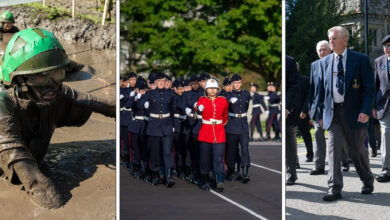Election CoverageEvents
The Conservative Party of Canada: Defence Policies & Veteran Support
On September 22nd, 2019, leader of the Conservative Party of Canada, Andrew Scheer, announced the intent to provide more support for Canadian veterans as part of his platform.
“After October 21, we are going to make things better,” Scheer promised. “Instead of forcing Veterans to work harder for government benefits, it’s time the government worked harder for our Veterans’ benefit.”
The Conservative Party has emphasized their plans to:
- Preserve a Military Covenant between the Government of Canada and all Canada’s Veterans in legislation, which would ensure that every Veteran is respected and provided services in a timely manner.
- Clear the existing backlog of Veterans’ benefit applications within 24 months.
- Create a pension system that is fair to Canada’s most disabled Veterans.
- Improve transition services that support discharged or retired Canadian Armed Forces members.
- Provide more service dogs to Canadian Veterans in their communities.
- Put vital commemoration projects, like the National Memorial for Canada’s War in Afghanistan, back on track.
When it comes to the Conservative position on defence, it has been predicted that the party will revive previous policies such as sharing RADARSAT-2 images with Ukraine — one adopted by the previous Conservative government but cut by the Liberals.
David Perry, vice president and senior analyst at the Canadian Global Affairs Institute, has suggested that the party will be focusing on “shifting strategic relationships that reinvigorated alliance relationships with US’s role in international power, re-engagement with traditional allies, NATO and the Five Eyes Anglo-Community.”
“They have said for a few years now that they would build another entrance supply ship. They would launch talks with the United States around ballistic missile defence and the renewal of NORAD. They are going to start looking at acquiring new submarines,” he added.
However, when looking at defence policies as a whole, Perry also mentioned that it was “striking how little real difference there is between the two parties [Conservatives and Liberals] when in office.
They basically act in relatively similar ways, and it’s tied into more about how much money is available for the Government of Canada at large – and if spending on government broadly is in a position to go up, defence spending goes up.”
When comparing the two-party platforms, he added, “I think the bigger difference is that the Conservatives spend a lot more time talking about defence. The Prime Minister has spent almost no time talking about anything related to defence for the last four years, whereas Mr. Scheer has given one longer speech and one press conference around those parts of his platform.”
Back in 2006, the New Veteran’s Charter was introduced by the government of the day, which was a Conservative Government under former prime minister Stephen Harper.








